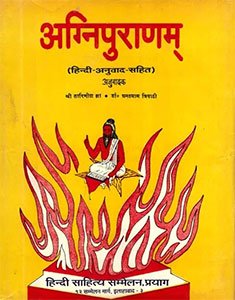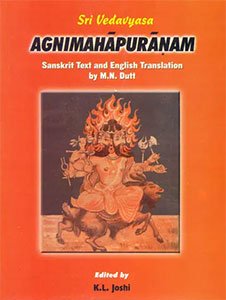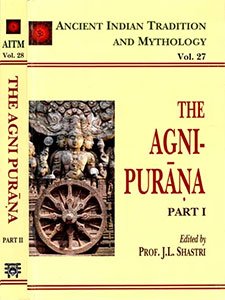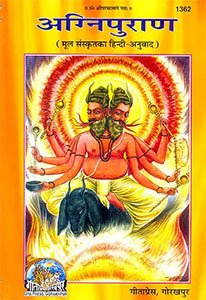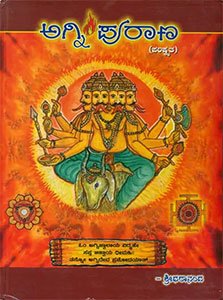Agni Purana [sanskrit]
97,288 words
This Sanskrit edition of the Agnipurana. It is one of the traditional eighteen Mahapuranas presented as an encyclopedia of ancient Indian history and knowledge. It contains either 382 or 383 chapters and over 10.000 verses (Sanskrit Shlokas).
Verse 175.58
धर्मं देहि धनं देहि सौभाग्यं गुणसन्ततिं ।
कीर्तिं विद्यां देहि चायुः स्वर्गं मोक्षञ्च देहि मे ॥ ।
इमां पूजां व्रतपते गृहीत्वा व्रज साम्प्रतं ।
पुनरागमनायैव वरदानाय वै प्रभो ॥ ५८ ॥
dharmaṃ dehi dhanaṃ dehi saubhāgyaṃ guṇasantatiṃ |
kīrtiṃ vidyāṃ dehi cāyuḥ svargaṃ mokṣañca dehi me || |
imāṃ pūjāṃ vratapate gṛhītvā vraja sāmprataṃ |
punarāgamanāyaiva varadānāya vai prabho || 58 ||
The Sanskrit text of Verse 175.58 is contained in the book The Agni Puranam (Anandashram Edition) by Shri Chimna Apate (श्री चिमणा आपटे). This book is available online or you could buy the latest edition:
Read online Buy now! The Sanskrit text by Shri Chimna Apate (श्री चिमणा आपटे) (1987)
Glossary of Sanskrit terms
Note: This extracts Sanskrit terms and links to English definitions from the glossary, based on an experimental segmentation of verse (175.58). Some terms could be superfluous while some might not be mentioned. Click on the word to show English definitions.
Dharma, Dehi, Dehin, Dhana, Saubhagya, Guna, Santati, Kirti, Vidya, Cayu, Svarga, Asmad, Iyam, Idam, Puja, Vratapati, Grihitva, Vraja, Sampratam, Samprata, Punaragamana, Varadana, Prabhu,
Analysis of Sanskrit grammar
Note: this is an experimental feature and only shows the first possible analysis of the Sanskrit text (Verse 175.58). If the system was successful in segmenting the sentence, you will see of which words it is made up of, generally consisting of Nouns, Pronouns, Verbs, Participles and Indeclinables. Click on the link to show all possible derivations of the word.
- Line 1: “dharmaṃ dehi dhanaṃ dehi saubhāgyaṃ guṇasantatiṃ ”
- dharmam -
-
dharma (noun, masculine)[adverb], [accusative single]dharman (noun, masculine)[adverb]dharman (noun, neuter)[adverb]dharmā (noun, feminine)[adverb]
- dehi -
-
dehī (noun, feminine)[adverb], [vocative single]dehin (noun, masculine)[compound], [adverb]dehin (noun, neuter)[compound], [adverb], [nominative single], [vocative single], [accusative single]√dā (verb class 3)[imperative active second single]
- dhanam -
-
dhana (noun, masculine)[adverb], [accusative single]dhana (noun, neuter)[adverb], [nominative single], [accusative single]
- dehi -
-
dehī (noun, feminine)[adverb], [vocative single]dehin (noun, masculine)[compound], [adverb]dehin (noun, neuter)[compound], [adverb], [nominative single], [vocative single], [accusative single]√dā (verb class 3)[imperative active second single]
- saubhāgyam -
-
saubhāgya (noun, neuter)[adverb], [nominative single], [accusative single]saubhāgyā (noun, feminine)[adverb]
- guṇa -
-
guṇa (noun, masculine)[compound], [vocative single]
- santatim -
-
santati (noun, feminine)[accusative single]santati (noun, masculine)[accusative single]
- Line 2: “kīrtiṃ vidyāṃ dehi cāyuḥ svargaṃ mokṣañca dehi me || ”
- kīrtim -
-
kīrti (noun, feminine)[accusative single]kīrti (noun, masculine)[accusative single]
- vidyām -
-
vidyā (noun, feminine)[accusative single]√vid (verb class 2)[optative active first single]
- dehi -
-
dehī (noun, feminine)[adverb], [vocative single]dehin (noun, masculine)[compound], [adverb]dehin (noun, neuter)[compound], [adverb], [nominative single], [vocative single], [accusative single]√dā (verb class 3)[imperative active second single]
- cāyuḥ -
-
cāyu (noun, masculine)[nominative single]cāyu (noun, feminine)[nominative single]
- svargam -
-
svarga (noun, masculine)[adverb], [accusative single]svarga (noun, neuter)[adverb], [nominative single], [accusative single]svargā (noun, feminine)[adverb]
- mokṣañ -
-
mokṣā (noun, feminine)[adverb]
- ca -
-
ca (indeclinable conjunction)[indeclinable conjunction]ca (noun, masculine)[compound], [vocative single]ca (noun, neuter)[compound], [vocative single]
- dehi -
-
dehī (noun, feminine)[adverb], [vocative single]dehin (noun, masculine)[compound], [adverb]dehin (noun, neuter)[compound], [adverb], [nominative single], [vocative single], [accusative single]√dā (verb class 3)[imperative active second single]
- me -
-
ma (noun, masculine)[locative single]ma (noun, neuter)[nominative dual], [vocative dual], [accusative dual], [locative single]mā (noun, feminine)[nominative dual], [vocative single], [vocative dual], [accusative dual]asmad (pronoun, none)[dative single], [genitive single]
- Line 3: “imāṃ pūjāṃ vratapate gṛhītvā vraja sāmprataṃ ”
- imām -
-
iyam (noun, feminine)[accusative single]idam (pronoun, feminine)[accusative single]
- pūjām -
-
pūjā (noun, feminine)[accusative single]
- vratapate -
-
vratapati (noun, masculine)[vocative single]
- gṛhītvā -
-
gṛhītvā (indeclinable)[indeclinable]√grah -> gṛhītvā (absolutive)[absolutive from √grah]
- vraja -
-
vraja (noun, masculine)[compound], [vocative single]vraja (noun, neuter)[compound], [vocative single]√vraj (verb class 1)[imperative active second single]
- sāmpratam -
-
sāmpratam (indeclinable)[indeclinable]sāmprata (noun, masculine)[adverb], [accusative single]sāmprata (noun, neuter)[adverb], [nominative single], [accusative single]sāmpratā (noun, feminine)[adverb]
- Line 4: “punarāgamanāyaiva varadānāya vai prabho ”
- punarāgamanāyai -
-
punarāgamana (noun, neuter)[dative single]
- aiva -
-
√i (verb class 2)[imperfect active first dual]
- varadānāya -
-
varadāna (noun, neuter)[dative single]
- vai -
-
√vā (verb class 1)[present middle first single], [imperative middle first single]
- prabho -
-
prabhu (noun, masculine)[vocative single]prabhu (noun, feminine)[vocative single]
Other editions:
Also see the following editions of the Sanskrit text or (alternative) English translations of the Verse 175.58
Agni Purana with Hindi Translation
by Tarinish Jha and Dr. Ghanshayam Tripathi (तारिणीश् झा और डॉ. घनश्याम त्रिपाठी) (2007)
Publisher: Hindi Sahitya Sammelan, Allahabad; 1199 pages; Title: अग्निपुराणम् (संस्कृत एवं हिन्दी अनुवाद);
Buy now!
Agni Purana (Two Volumes)
by M. N. Dutt (2023)
Publisher: Parimal Publication Pvt. Ltd.; Editor: K. L. Joshi.; ISBN-10: 8171101690; ISBN-13: 9788171101696; 1070 pages.
Buy now!
Agni-Purana (Set of 4 Volumes)
by N. Gangadharan (2006)
Publisher: Motilal Banarsidass Publishers Pvt. Ltd.; ISBN: Part I 8120803590 (9788120803596); Part II 8120803604 (9788120803602); Part III 8120801741 (9788120801745); Part IV 812080306X (9788120803060); 1271 pages.
Buy now!
The Agni Purana (Hindi)
by (2013)
Publisher: Gita Press, Gorakhpur; Title: अग्निपुराण (केवल हिन्दी अनुवाद); ISBN-10: 8129302934; ISBN-13: 9788129302939; 848 pages.
Buy now!
Agni Purana (Kannada)
by Sreedharananda (2013)
Publisher: Pooja Pusthaka Bhandara, Bangalore; Title: ಅಗ್ನಿ ಪುರಾಣ; 560 pages.
Buy now!Preview of verse 175.58 in Kannada sript:
ಧರ್ಮಂ ದೇಹಿ ಧನಂ ದೇಹಿ ಸೌಭಾಗ್ಯಂ ಗುಣಸನ್ತತಿಂ ।
ಕೀರ್ತಿಂ ವಿದ್ಯಾಂ ದೇಹಿ ಚಾಯುಃ ಸ್ವರ್ಗಂ ಮೋಕ್ಷಞ್ಚ ದೇಹಿ ಮೇ ॥ ।
ಇಮಾಂ ಪೂಜಾಂ ವ್ರತಪತೇ ಗೃಹೀತ್ವಾ ವ್ರಜ ಸಾಮ್ಪ್ರತಂ ।
ಪುನರಾಗಮನಾಯೈವ ವರದಾನಾಯ ವೈ ಪ್ರಭೋ ॥ ೫೮ ॥
![Agni Purana [sanskrit] - book cover](/uploads/a/Agni-Purana-Sanskrit.jpg)
